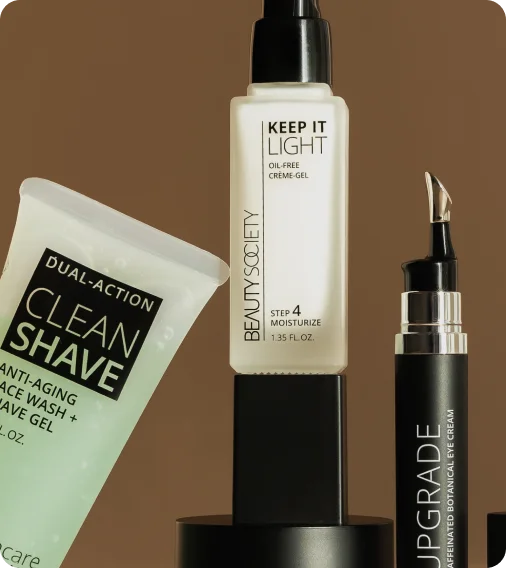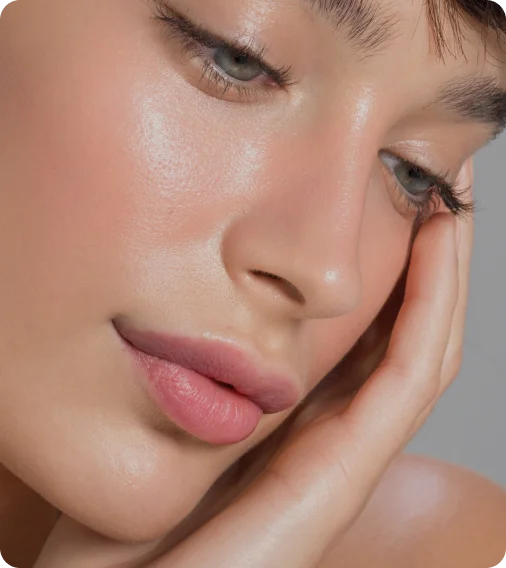When it comes to skincare, many people cleanse or exfoliate. A common misconception is that you should do one but not the other although both cleansers and exfoliators are vital for fresh, healthy-looking skin. Cleansing removes dirt and grime from your pores, while exfoliators give a deeper clean, clearing clogged pores and removing dead cells from the skin’s surface. Here we look at the differences between cleansing and exfoliating and why both are necessary for your skincare routine.
What is a cleanser?
Keeping your skin clean is one of the most important parts of skincare, removing dirt and debris that can build up on your face day and night. Once you’ve found the right cleanser for your skin, it’s simple to use it in the morning and evening. It’s important to cleanse your skin twice a day; too much and it will become dry and irritated. Too little, and dirt and debris will be left on your skin to clog your pores.
Face cleansers are effective and inexpensive and can make a real difference in your overall complexion. Water alone isn’t enough to get rid of impurities, and it can strip your skin of essential oils. When you start using a proper cleanser, you won’t turn back!
What are the benefits of a face cleanser?
Face cleansers offer many benefits and reasons to use one in your everyday routine. From removing dirt from your skin to keeping it sufficiently hydrated, here are some of the main reasons you need one.
It removes a build-up of dirt and debris on the skin
There are many ways dirt and debris can build up on your skin. Pollution from the outside air, dust, shedding of dead skin cells, and more can all collect over time. This, in turn, can clog your pores leading to spots and a dull-looking complexion. By cleansing, you remove these before they can build up and cause any skin issues.
Removing dirt from the surface of your skin also creates an ideal base for your makeup and other skin care products such as toners and moisturizers. They will sit better on the skin’s surface and be absorbed easier, allowing your skin to reap the benefits they provide.
It keeps your skin hydrated
If your skin is dehydrated, it will look and feel textured and rough and can cause itching and tightness. Your complexion and skin tone might be uneven, and it’ll be harder to apply makeup. In addition, most face cleansers contain moisturizing properties that keep the natural pH levels balanced and improve your skin’s water retention, so it stays hydrated longer.
It can help with specific skincare concerns
If you have a specific skin problem, using the right face cleanser can be a great way to combat this. Whether you have acne, sensitive skin, excessively dry, or overly oily skin, there’s a cleanser designed to tackle it. Using a carefully tailored combination of ingredients, it can hone in on specific issues, improving the appearance and condition of your skin that wouldn’t be possible if washing with water alone—or not washing at all.
How should you implement cleansing into your skincare routine?
Cleansing is the base of your skincare routine and what you need to do before anything else. But how should you implement cleansing into your routine for maximum impact?
- Find a face cleanser developed for your skin type (dry/ oily/ combination/ sensitive)
- Select the form of cleanser you prefer, whether a gel, cream, foam, or bar cleanser
- Cleanse your skin both in the morning and the evening
- Be gentle and apply the cleanser in circular motions
- Use lukewarm, not hot, water to avoid irritating your skin
- Pat your face dry with a towel but don’t rub it
- Follow with a toner and moisturizer
What is an exfoliator?
An exfoliator scrubs your skin and targets dead skin cells and built-up dirt for a deeper cleanse. This gets deeper into the pores than a general face cleanser, whether it’s an exfoliating cleanser or tool. Exfoliators are usually a grainy-textured substance to be massaged directly onto the skin.
Exfoliating once or twice a week is generally recommended to keep your skin clear and healthy. More often can be too harsh on your skin, stripping the good and bad oils. Your skin then tends to react in one of two ways: It becomes excessively dry, resulting in inflammation and irritation, or it produces extra sebum to compensate for the loss of moisture. This extra sebum can clog your pores and cause additional issues such as acne, blackheads, and an oily shine, all of which impact your skin’s appearance.
An exfoliator is something that everyone should add to their skincare routine to enhance their skin’s health and appearance.
What are the benefits of an exfoliator?
Now that we’ve clarified what an exfoliator is, let’s look at the benefits it can provide:
Exfoliators unclog your pores on a deeper level
While normal cleansing is a great way to keep your skin clear, dirt and debris can penetrate deep into your pores and be missed. This is where an exfoliator comes in. Exfoliating your skin can remove this buildup, preventing pores from becoming blocked and developing into blackheads and pimples.
It boosts circulation and lymphatic drainage
Lymphatic fluid can build up in the face, usually due to an illness or medical treatment, but stress and other lifestyle factors can also cause it. An exfoliator can help drain this fluid, remove toxins and waste, and enhance blood flow and circulation. This increased blood flow improves the appearance of your skin, making it look less puffy and brighter. It can also reduce the appearance of wrinkles and fine lines.
It stimulates the production of collagen
Collagen is one of the most important components of your skin, aiding in elasticity, hydration, and skin texture. As we age, our collagen naturally decreases, and the cellular renewal process slows down. Using an exfoliator on your skin causes mild trauma, which signals to your brain that repair is needed. This releases histamine, triggering an inflammatory response and sending plenty of plasma-rich blood to the face to heal the area. After a few days, this causes the collagen in your skin to be synthesized, improving the structure of your skin and making it plump and healthy.
It prevents acne
Acne can be caused by your pores becoming blocked with dirt, oil, and dead skin cells. When mixed with sebum and bacteria, this blocks the pores and causes them to swell and turn into pimples. Large, painful pimples and cystic acne occurs when bacteria infect the pores, generate pus, and create blemishes. By exfoliating regularly, you stop the pores from becoming blocked, making it difficult for acne to develop. It also helps stimulate cell renewal, improve your skin’s texture, and soothe your skin, keeping it healthy and discouraging acne breakouts in the future.
How should you implement an exfoliator into your skincare routine?
Exfoliation should be done alongside cleansing. However, you don’t need to do it quite so often. Cleanse your skin twice a day, and use an exfoliator just once or twice a week. To get the most from exfoliating, you should:
- Begin by exfoliating once a week and see how your skin reacts. Some people find this too little and can do it twice weekly, whereas others (such as those with sensitive skin) find exfoliating more often can irritate the skin. It’s important to see what works best for your own skin and adjust as necessary.
- Exfoliate when you wake up. Your skin regenerates overnight, leaving a layer of dead skin cells. By removing them first, your skin will look brighter and healthier, and it won’t have the chance to develop clogged pores.
- Find the best exfoliator for you. The market has a host of different exfoliating scrubs made with everything from coffee grounds or granulated sugar to ground apricot pits and exfoliation beads. You’ll also find exfoliator brushes, pads, and devices.
- Try a soft terrycloth washcloth for gentle yet effective exfoliation.
- Don’t leave products on the skin for too long, particularly if they contain chemicals.
- Follow up with a hydrating moisturizer and toner.
Closing thoughts
Both cleansing and exfoliating are beneficial for your skin in different ways. Cleansing should be implemented into your everyday routine to rid your skin of makeup, dirt, and impurities. Exfoliators, on the other hand, offer a deeper clean that can unclog pores and prevent pimples and other skin issues. When used together, they can greatly improve the appearance and health of your skin from the inside out.
Here at Beauty Society, we have a range of cleansing and exfoliating products designed for all skin types. Check out our website to find the best products for you.


